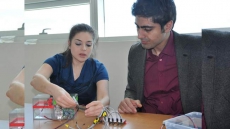LETHBRIDGE, Alta. — The jury in the case of an Alberta couple charged in the meningitis death of their toddler son has begun a second day of deliberations.
David Stephan, who is 32, and Collet Stephan, who is 35, are charged with failing to provide the necessaries of life to 19-month-old Ezekiel in 2012.
The four-man, eight-woman jury deliberated for about five hours Monday before retiring for the night.
In his charge to the jury, Justice Rodney Jerke told them to be convinced beyond a reasonable doubt of the accused's guilt and not to make their decisions based on "sympathy, prejudice or fear."
The couple testified they believed that Ezekiel had croup or flu, so they treated him for 2 1/2 weeks with remedies that included hot peppers, garlic, onions and horseradish.
He eventually stopped breathing and died a couple of days after being rushed to hospital.
The defence argued the couple were loving, responsible parents who simply didn't realize how sick the little boy was. The Crown said they didn't do enough to ensure Ezekiel received the medical treatment he required, noting they had been warned by a friend who was a registered nurse that the boy probably had meningitis.
The case has drawn international attention, due in part because of the societal divide between those who do and don't believe in the natural medicine movement.
A website called "Stand 4 Truth" has been providing daily updates on the trial and comes with a link allowing people to donate to a fund for the couple.

"In the event of a guilty verdict, the Stephans' children will likely be separated from them for up to five years," said one recent post.
"They will have permanent criminal records and will likely never have the opportunity to provide adequately for their family when they do get out of prison."
David Stephan declined comment Monday, but he told The Canadian Press in an interview before the trial that he believed he and his wife were charged because they didn't vaccinate their children and, in part, because his family helped start a nutritional supplements company.
His father, Anthony Stephan, co-founded Truehope Nutritional Support in Raymond, Alta., in 1996 after his wife committed suicide.
The company's website says the woman and some of the couple's 10 children had been diagnosed with bipolar disorder, so Anthony Stephan formed the company with a friend to find a natural treatment.
The company says one of its products, EMPowerplus, helps treat bipolar disorder, depression and even autism.
Truehope fought to be able to sell EMPowerplus for more than a decade before an Alberta judge ruled that it could be sold here as a drug. It’s now shipped to more than 100 countries.
David Stephan, a Truehope vice-president, said he heard so many stories from parents about vaccinations causing autism in their children that he and his wife decided they wouldn't vaccinate their own kids.
He said that still held true for their three remaining boys — eight-year-old Ezra, three-year-old Ephraim and one-year-old Enoch.
"We're actually more adamant than we ever were," he said in the pre-trial interview, adding they are a typical, loving family — not criminals.
"If everybody could see it from exactly how we saw it, they would have a full understanding and be like, 'Oh wow. You were basically blindsided and didn't understand what was really going on.'"
The maximum penalty for failing to provide the necessaries of life is five years in prison.
A LOOK AT THE FINAL DAYS OF 19-MONTH-OLD EZEKIEL STEPHAN AND HOW HE WAS TREATED

A jury is deliberating at the trial of David and Collet Stephan, who are charged with failing to provide the necessaries of life for their 19-month-old son Ezekiel. A medical examiner ruled the boy died of bacterial meningitis. Here are some key dates court heard about in the last days of the boy's life:
August 20, 2010: Ezekiel Stephan is born at home with the assistance of birthing assistant Terry Meynders, who is also a registered nurse.
February 27, 2012: Ezekiel takes ill at the family home in Glenwood, Alta. His mother describes him as having a cold, stuffy nose and trouble breathing. "The sound he was making was heartwrenching. This isn't the kind of sound you want to hear from your child," she testifies later at the trial.
February 28-March 5, 2012: Ezekiel is treated for what his parents believed to be croup, an upper airway infection that leads to a barking cough. In addition to regular smoothies, they give the boy olive leaf extract, garlic, hot peppers and horseradish. They also attempt to help his breathing with cool air and a humidifier.
March 5, 2012: Ezekiel seems to improve. His father says the boy is not 100 per cent, but he no longer has any difficulty breathing and is able to go to preschool. He plays with his toys and manages to eat some solid food.
March 6, 2012: Ezekiel suffers a setback. He is "unusually lethargic," lays in bed the entire day and his only response is to moan unhappily. He doesn't eat or drink and is exhibiting unusual neurological symptoms.
March 7, 2012: Ezekiel seems to improve again. His abnormal movements stop and he can watch TV, but still isn't playing normally.
March 8-10, 2012: Ezekiel's parents note he seems to be gradually improving. He regains a bit of his appetite, but is not active or playful.
March 11, 2012: Ezekiel's symptoms worsen again. He refuses to eat or drink and is lethargic. His parents notice his body is very stiff.
March 12, 2012: Ezekiel's body is so stiff that his back is arched. He is getting fluids through an eyedropper because he will not drink on his own. Meynders comes to the home and checks his vitals. She suggests he could possibly have viral meningitis and says she tells the mother she should take the boy to a doctor. "It did not jump out at me that he was that seriously ill," Meynders testifies.
March 13, 2012: The Stephans head to Lethbridge to pick up an echinacea mixture from a naturopath. Ezekiel is too stiff to sit in his car seat and has to lie on a mattress in the vehicle. Back at home that evening, the boy stops breathing on a couple of occasions before his parents leave home to meet an ambulance. The breathing equipment in the ambulance it too large to properly help a small child. The boy is taken to hospital in Cardston and then to Lethbridge for transport to Calgary by air.
March 14, 2012: Ezekiel arrives at Alberta Children's Hospital in Calgary where doctors tell the parents the boy is showing very little brain activity and the prognosis is bleak. He is put on life support.
March 16, 2012: Ezekiel dies.





